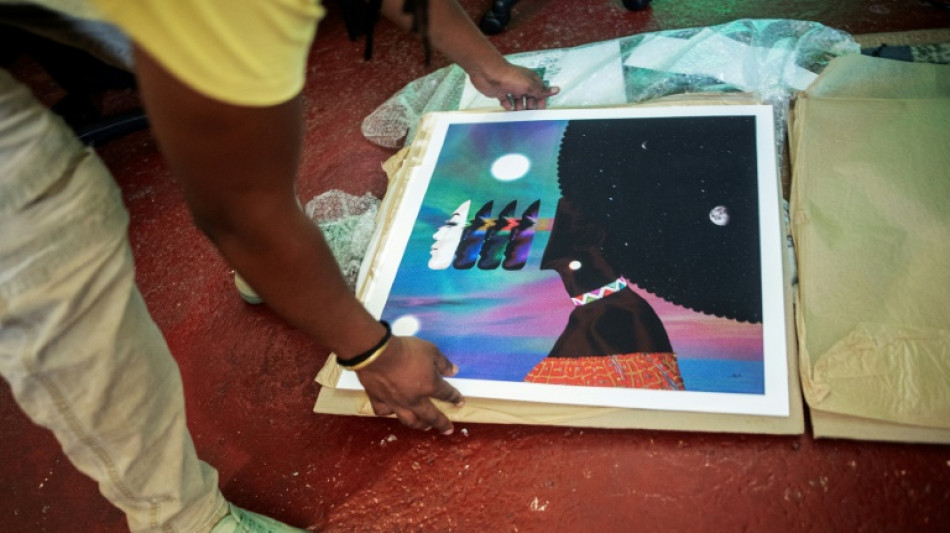
-
 Palestinians welcome ICC arrest warrants for Israeli officials
Palestinians welcome ICC arrest warrants for Israeli officials
-
Senegal ruling party wins parliamentary majority: provisional results

-
 Fiji's Loganimasi in for banned Radradra against Ireland
Fiji's Loganimasi in for banned Radradra against Ireland
-
New proposal awaited in Baku on climate finance deal

-
 Brazil police urge Bolsonaro's indictment for 2022 'coup' plot
Brazil police urge Bolsonaro's indictment for 2022 'coup' plot
-
NFL issues security alert to teams about home burglaries

-
 Common water disinfectant creates potentially toxic byproduct: study
Common water disinfectant creates potentially toxic byproduct: study
-
Chimps are upping their tool game, says study

-
 US actor Smollett's conviction for staged attack overturned
US actor Smollett's conviction for staged attack overturned
-
Fears rise of gender setbacks in global climate battle

-
 'World's best coach' Gatland 'won't leave Wales' - Howley
'World's best coach' Gatland 'won't leave Wales' - Howley
-
Indian PM Modi highlights interest in Guyana's oil

-
 Israel strikes kill 22 in Lebanon as Hezbollah targets south Israel
Israel strikes kill 22 in Lebanon as Hezbollah targets south Israel
-
Argentina lead Davis Cup holders Italy

-
 West Bank city buries three Palestinians killed in Israeli raids
West Bank city buries three Palestinians killed in Israeli raids
-
Fairuz, musical icon of war-torn Lebanon, turns 90

-
 Jones says Scotland need to beat Australia 'to be taken seriously'
Jones says Scotland need to beat Australia 'to be taken seriously'
-
Stock markets push higher but Ukraine tensions urge caution

-
 IMF sees 'limited' impact of floods on Spain GDP growth
IMF sees 'limited' impact of floods on Spain GDP growth
-
Fresh Iran censure looms large over UN nuclear meeting

-
 Volkswagen workers head towards strikes from December
Volkswagen workers head towards strikes from December
-
'More cautious' Dupont covers up in heavy Parisian snow before Argentina Test

-
 UK sanctions Angola's Isabel dos Santos in graft crackdown
UK sanctions Angola's Isabel dos Santos in graft crackdown
-
Sales of existing US homes rise in October

-
 Crunch time: What still needs to be hammered out at COP29?
Crunch time: What still needs to be hammered out at COP29?
-
Minister among 12 held over Serbia station collapse

-
 Spurs boss Postecoglou hails 'outstanding' Bentancur despite Son slur
Spurs boss Postecoglou hails 'outstanding' Bentancur despite Son slur
-
South Sudan rejects 'malicious' report on Kiir family businesses

-
 Kyiv claims 'crazy' Russia fired nuke-capable missile
Kyiv claims 'crazy' Russia fired nuke-capable missile
-
Australia defeat USA to reach Davis Cup semis

-
 Spain holds 1st talks with Palestinian govt since recognising state
Spain holds 1st talks with Palestinian govt since recognising state
-
Stock markets waver as Nvidia, Ukraine tensions urge caution

-
 Returning Vonn targets St Moritz World Cup races
Returning Vonn targets St Moritz World Cup races
-
Ramos nears PSG return as Sampaoli makes Rennes bow

-
 Farrell hands Prendergast first Ireland start for Fiji Test
Farrell hands Prendergast first Ireland start for Fiji Test
-
Gaza strikes kill dozens as ICC issues Netanyahu arrest warrant

-
 Famed Berlin theatre says cuts will sink it
Famed Berlin theatre says cuts will sink it
-
Stuttgart's Undav set to miss rest of year with hamstring injury

-
 Cane, Perenara to make All Blacks farewells against Italy
Cane, Perenara to make All Blacks farewells against Italy
-
Kenya scraps Adani deals as Ruto attempts to reset presidency

-
 French YouTuber takes on manga after conquering Everest
French YouTuber takes on manga after conquering Everest
-
Special reunion in store for France's Flament against 'hot-blooded' Argentina

-
 'World of Warcraft' still going strong as it celebrates 20 years
'World of Warcraft' still going strong as it celebrates 20 years
-
Fritz pulls USA level with Australia in Davis Cup quarters

-
 New Iran censure looms large over UN nuclear meeting
New Iran censure looms large over UN nuclear meeting
-
The first 'zoomed-in' image of a star outside our galaxy

-
 ICC issues arrest warrants for Netanyahu, Gallant, Deif
ICC issues arrest warrants for Netanyahu, Gallant, Deif
-
Minister among 11 held over Serbia station collapse

-
 Historic gold regalia returned to Ghana's king
Historic gold regalia returned to Ghana's king
-
Kyiv accuses Russia of launching intercontinental ballistic missile attack


Amid NFT boom, artists worry about climate costs
Digital art is nothing new to vonMash, who describes his blend of painting, video and sound as "afro-delic" -- a psychedelic twist on Afrofuturism.
But when the South African started thinking about selling his work as crypto-art on a blockchain, he hesitated.
"I'm not fully for it because of the energy consumption that it takes," he explained.
Selling art as non-fungible tokens, or NFTs, uses the same technology as crypto-currencies like Bitcoin. The buyer receives a verified digital token, which proves the artwork is an original.
The boon for artists is that if their work goes up in value and is resold, they receive a portion of every future sale.
"If another person buys my NFT, I automatically get a share of that," vonMash said. With traditional art, if a buyer pays 100 dollars, and then "sells it for 100,000, I would not get a cent of that."
- Warehouse of computers -
What worries vonMash and other artists is how those digital tokens get verified.
Ownership of the artwork is authenticated through complex mathematical puzzles -- so complex that the calculations require warehouses of computers.
Companies who solve the puzzles get rewarded with new tokens, and their solutions add a "block" to the chain of the authentification.
The number-crunching requires vast amounts of energy, often produced by coal-power electricity plants.
Most NFTs are currently traded on a platform on a called Ethereum. Tech watchdog Digiconomist estimates that Ethereum uses as much electricity as all of the Netherlands, with a carbon footprint comparable to Singapore's.
"The energy it takes for the proof of authentication for the artwork, it’s so much," vonMash said.
He has reason to worry.
Climate concerns have sparked a backlash against NFTs.
K-pop fans in South Korea last year staged a brutal campaign against plans for popular groups include BTS and A.C.E. to sell crypto-art.
"Essentially NFTs are a giant environment-destroying pyramid scheme," read a widely retweeted comment from @ChoicewithACE typical of comments that prompted the group to cancel their offering.
BTS's music label Hybe decided to postpone their launch, looking for greener alternatives.
In South Africa, environmentalism is an unquestioned article of faith among many artists.
One collective called The Tree created a platform for artists to sell NFTs, and then collaborate with a Cape Town charity called Greenpop to plant trees to offset the carbon emited from the crypto-art sales.
- Evolving world -
Fhatuwani Mukheli said that system made him feel confident about the two NFT sales he's already made.
"The world is constantly evolving," he said. "If I just hold on to what I know, then the bus is going to miss me."
For vonMash, the solution was not to sell on Ethereum, but to place his art on a platform called Cardano, which uses a different authentication system.
Rather than have companies solve ever-harder puzzles, Cardano uses a mechanism called "proof of stake".
Instead of earning new tokens by solving puzzles -- and gobbling up electricity -- users can simply pony up tokens they already have.
Essentially, they're using their money in the form of crypto-currency to vouch for the authenticity of a digital artwork.
If someone tries to game the system, or simply makes a mistake, they could lose their financial stake in the network.
The underlying technology can be confusing, but social impact consultant Candida Haynes said "the short story is that there are less environmentally hazardous options for NFTs."
"Ultimately, blockchain developers have to also engage with sustainability and help keep less technical folks, including artists, informed about the state of environmental sustainability in blockchains," she said.
S.Keller--BTB

